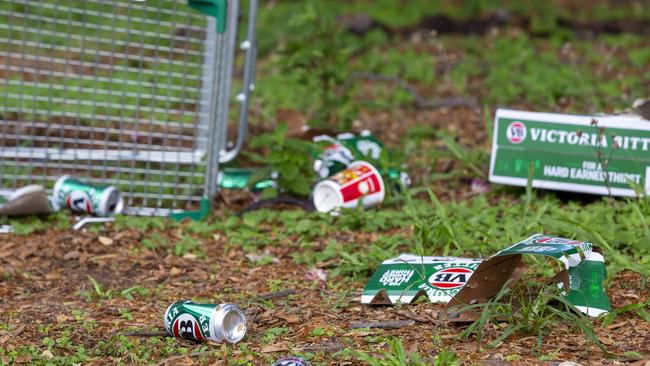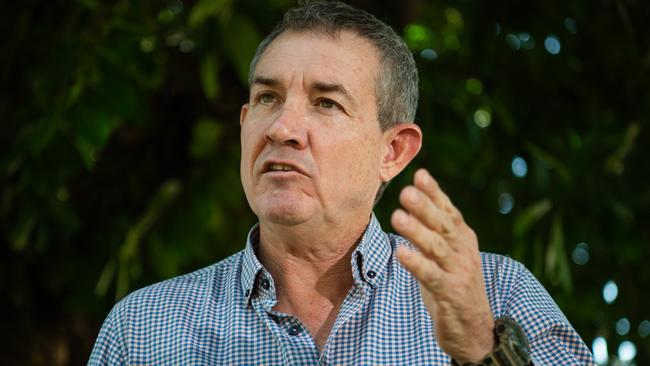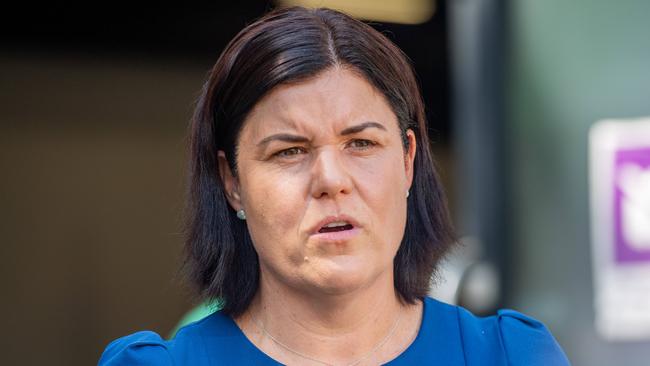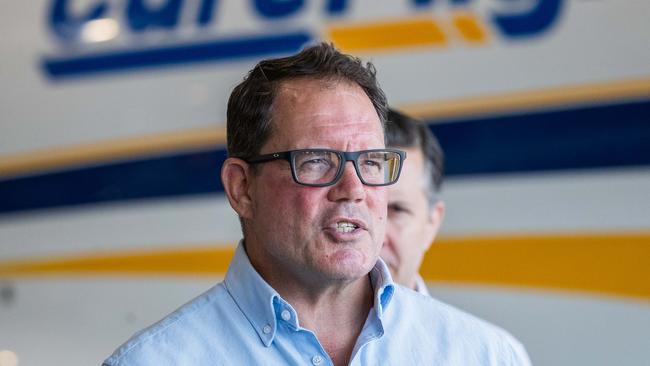CLP’s bid to criminalise public drunkenness voted down in parliament
The CLP has failed to pass proposed laws to crack down on public drinking and give police the power to issue fines. Have your say in our poll.
Northern Territory
Don't miss out on the headlines from Northern Territory. Followed categories will be added to My News.
A bid to give police greater powers to deal with public drinking has been shut down in Territory parliament.
CLP legislation returned to parliament on Wednesday, after it was first introduced in February, that would have made it an offence carrying penalties to drink within 2km of a licensed premises.
Current laws stipulate it is already an offence to drink within this radius of a licenced premises and those found doing so are subject to search and seize police powers, however they may only be charged if behaviour escalates to become disorderly.

Deputy Opposition Leader Gerard Maley said police should be able to issue a fine of 0.5 penalty units ($88) to those found with grog.
“Our legislation gives the police power to be proactive and stop those crimes and stop people drinking together, which will stop alcohol related harm and violence into the future,” he said.
“(Currently) if you’re drinking in a public place and you’re not causing a nuisance, there is no power for the police to do anything other than to tip that alcohol out.
“We’re talking about police being proactive (in dealing with people) sitting around, drinking in a public place which leads to anti-social behaviour.”

The proposed laws, which the government did not support, would be at odds with most other states where public drunkenness is not a criminal offence.
The CLP also sought to give police the power to take someone’s name after they were found drinking in a prohibited public place.
That mirrors a recommendation of an overdue review into the Liquor Act, which Chief Minister Natasha Fyles tabled this week along with a promise to act on some of its requests by the end of this year.
Ms Fyles said the CLP legislation would have brought little change to the way police operated.
“It is against the law to drink in public in Darwin, Alice Springs, Katherine, Palmerston, Tennant Creek, the Darwin Waterfront Precinct and within 2km of any licensed premises,” she said.
“Police have the powers to tip out, destroy alcohol consumed in these areas, and they still hold the powers to arrest and infringe when behaviour becomes disorderly.”
The CLP legislation had the support of the NT Police Association.
Fyles flags new alcohol laws in parliament
The government has promised to introduce new alcohol laws that would give police greater powers to deal with public drinkers and put people on the banned drinkers register.
Chief Minister Natasha Fyles tabled a three-year review of the Liquor Act in Tuesday’s parliament sittings, saying she intends to introduce legislation in the November sittings.
Suggested changes include a greater range of pathways to the banned drinkers register including first-time drink driving fines, even for low-range drink drivers.
A string of offences including going armed in public, theft and robbery could also land someone on the BDR, should the government act on the recommendation.
The report calls for police powers to take the name of a person suspected to be drinking in a prohibited public place – a change the CLP has been calling for, while council rangers, security and transit officers could be given the power to search and seize alcohol in public.
Police would also be able to get information from the BDR for the purpose of investigating and “preventing the secondary supply of alcohol”.
It has been recommended that the moratorium on new takeaway licences be extended for another year as well.

Ms Fyles said every Territorian had the right to live and work in a safe community.
“Alcohol-related harm continues to be one of the greatest social issues facing the Northern Territory today, and no government has done more to stop it,” she said.
“The Territory government recognises the importance of a strong regulatory framework for alcohol in the Northern Territory, to minimise the harm that alcohol causes in our community and to provide certainty for business, the public and industry.
“The BDR is an effective supply and harm reduction tool for takeaway alcohol that is minimal cost and has no adverse impact to industry and consumers.”
Opposition leader Lia Finnochiaro said the CLP would “comb through” the detail of what the government has proposed but thought it did not go far enough.
“We will be continuing to debate and hopefully pass (our) legislation which will empower our police to deal with public drinking,” she said.
“Natasha Fyles can stand in parliament with her well and truly overdue review which does nothing to make our community safe or address alcohol-fuelled harm.
“But what the CLP is doing is bringing in real power for police to deal with problem drunks public drinking, and of course stopping crime from happening before it escalates.”
NT parliament divided on ‘where we go’ from Voice fallout
The referendum may be over but the question of ‘what now?’ remains with Northern Territory MLAs, who are heading into two weeks of parliament sittings.
The October sittings are also set to include reforms to how the corruption watchdog operates as well as a reintroduction of public drunkenness legislation.
Opposition Leader Lia Finocchiaro said while she did not support the Voice to Parliament proposal, the overwhelming Yes vote from remote Territorians showed they were “desperate for change”.
“That’s because for 18 out of (the past) 22 years, successive Territory Labor governments have totally failed them,” she said.
“These Aboriginal communities thought (the Voice) was a good idea and what that shows is that people in the bush want change.”
Ms Finocchiaro said the CLP, if elected next year, would reverse the government’s move to “consolidate councils into super shires” and bring back smaller local councils.
Chief Minister Natasha Fyles said the bush’s Yes vote showed remote Territorians “want to be included”.
“We’ve done that through local decision making, we’ve got a treaty process, but we will continue to strive to ensure that that voice can be heard at all levels of government and that we can deliver what the community needs,” she said.
Solomon MP Luke Gosling, who was in Canberra for federal parliament, said Territorians “rightly want to know where we go from here”.
“(The Voice question) didn’t resonate with the majority of people in Darwin and Palmerston, and that’s partially due to their lived experience and I think partially due to feeling that perhaps this Voice was going to be dominated by people from the East Coast,” he said on ABC Radio.

“It’s clear that it has not answered a lot of the questions that people had and I think people need to be convinced that change is going to happen locally.
“I’m optimistic about the future and that people have thought about these issues more deeply perhaps than they ever have and they do want to see things improve.”
The CLP will this week reintroduce legislation that seeks to grant police greater powers to deal with “problem drunks” in public, which the party first raised in February.
It is expected next week NT parliament will debate changes to the Independent Commission Against Corruption Act, which include strengthened protections for journalists, whistleblowers and witnesses.
Proposed changes will see ICAC barred from investigating minor misconduct in public office, to prioritise the watchdog’s focus on more serious matters.




